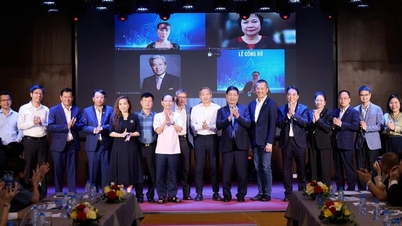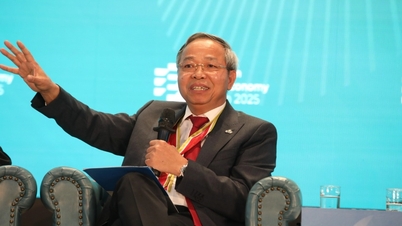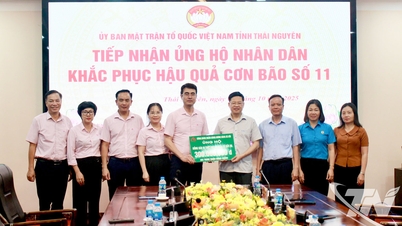According to the General Statistics Office ( Ministry of Finance ), the private sector has created 51% of GDP, contributed more than 30% of the State budget, and is also the largest employer, with about 9.1 million employees, accounting for 59.2% of the total number of employees in enterprises.
After the issuance of Resolution 68 of the Politburo , the private economic sector was identified as one of the three main pillars of an independent, autonomous and deeply integrated economy. The private business community is facing a great opportunity to join the State in creating a new growth model - where businesses are not only policy beneficiaries, but also policy co-creators.
In the picture of Vietnam's economic development, the private sector is increasingly asserting its role as an important driving force of growth and innovation.
The "third breakthrough" of the private economy
Ms. Tran Thi Thu Trang, Chairwoman of the Board of Directors of Hanel PT New Generation Technology Joint Stock Company, pointed out the fundamental factors that help private enterprises maintain the spirit of companionship and join hands with the State to overcome challenges.
“It is the trust and proper assessment of the role of the private economy from the Party and the State - considering it an important driving force of the economy. A consistent, synchronous policy system and a clear legal corridor help businesses have confidence and a basis for long-term development,” said Ms. Trang.
According to her, substantial support through specific mechanisms and actions will encourage businesses to innovate, improve competitiveness and contribute to society.
At Hanel PT, the spirit of cooperation and connection is always the core value in the corporate culture. Hanel PT steadfastly pursues a sustainable development model associated with ESG, sharing economy and culture of kindness. “The spirit of sharing helps businesses not only connect internally but also spread cooperation in the private business community,” said Ms. Trang.
"I have had the opportunity to lead many organizations and business networks, including the Keieijuku Vietnam Kind Business Community and am currently the President of the Bac Ninh Province Industrial Production Association. Through these activities, I hope to spread the spirit of cooperation and mutual support, contributing to building a strong, kind and integrated Vietnamese private business community," she shared.
Mr. Phan Duc Hieu, National Assembly Delegate, member of the Economic and Budget Committee, said that recent policies have aroused strong enthusiasm and aspirations of the private sector.
“In particular, Resolution 68 is a breakthrough in shifting the mindset from businesses only being allowed to do what the State permits to doing everything except what the law prohibits. This is a fundamental change in business rights,” Mr. Hieu emphasized.
According to him, this can be considered the third turning point in the history of private economic sector development - after the two previous breakthroughs of recognizing the private sector and reforming administrative procedures. If implemented effectively, Resolution 68 will help the private sector "change in quality", becoming the central driving force of the economy.
Mr. Hieu also recommended that the business community not only criticize policies, but also proactively propose new solutions and policies to perfect institutions and enhance implementation capacity.
“The spirit of creation and the aspiration to develop a strong country from the private sector are creating positive pressure, promoting a more dynamic and innovative public apparatus,” he said.

An employee checks money at a bank branch (Photo: Tien Tuan).
ViPEL - a new cooperation model between the State and enterprises
Ms. Pham Thi Ngoc Thuy, Director of the Office of the Private Economic Development Research Board (Board IV), said that the current reality lacks a common development strategy design. From there, the ViPEL model (private economic panorama) was born to connect businesses, associations and state agencies according to the new public-private mechanism. “The parties will have to have a mechanism to combine with each other, and large enterprises must lead small and medium enterprises according to the model of flying cranes,” Ms. Thuy said.
ViPEL aims to solve the "curse" of two Vietnamese enterprises not being able to go together, when a core enterprise will go with a small and medium enterprise according to the mechanism of the big leading the small.
Ms. Nguyen Thi Phuong Thao, Chairwoman of the Board of Directors of Sovico Group, representing Board IV, said that many Vietnamese private enterprises have the ability to come up with breakthrough solutions, contributing to the Vietnamese and regional economies.
She proposed that there should be a mechanism for private enterprises to contribute and be recognized. “With the current open policy, I call on the private sector to contribute and take the lead, to step up to implement national projects and programs that we previously did not have the opportunity to because they were stuck in the mechanism,” Ms. Thao emphasized.
Mr. Don Lam, co-founder and CEO of VinaCapital, Deputy Head of Board IV, said Board IV has submitted to the Prime Minister an initiative to establish a Private Economic Development Fund, focusing on gathering domestic private capital sources.
According to him, this fund aims at three main goals, including supporting groups of businesses that have the ability to go global and compete internationally; developing infrastructure; creating resources for small and medium-sized enterprises, which can come from banks or fintech.
“It is time for Vietnam to be financially autonomous and mobilize domestic capital to develop the private economy,” said Mr. Don Lam.

Currency transactions at a bank branch (Photo: Tien Tuan).
Need a separate capital mechanism for small and medium enterprises
Mr. Nguyen Van Than, Chairman of the Vietnam Association of Small and Medium Enterprises, said that this group - which accounts for more than 90% of the private sector - needs its own digital bank to serve them.
Many small and medium-sized enterprises are currently not eligible for loans under the normal process, so a special mechanism is needed. This idea also received the approval of Ms. Truong Ly Hoang Phi, Vice President of the Ho Chi Minh City Young Entrepreneurs Association, with the recommendation: "To have a digital bank, enterprises need to strongly transform digitally, because otherwise it will be difficult for any mechanism to assess the health of that enterprise."
Sharing about the Vietnam Private Economic Panorama Program, Mr. Mai Huu Tin, Deputy Head of the Private Economic Development Research Department (Department IV), Chairman of U&I Group, said that this is not a single event, but a series of annual actions lasting many years, aiming to link key projects of the private sector with the national development strategy.
“We do not speak in generalities. Each selected project has specific objectives, is monitored, tracked and has accompanying mechanisms and policies. That is the way to turn development aspirations into practical actions,” Mr. Tin emphasized.
According to him, this program is highly action-oriented, focusing on getting the private business sector directly involved in the planning and implementation of industry development projects. “The projects announced in the program are all proposed by the private business community, not by the management agency,” he added.
Mr. Tin acknowledged that this new approach marks a shift from "policy criticism" to "policy co-creation" thinking, when both the State and the private sector participate from ideation to implementation.
“We will have the simultaneous participation of both the State and the private sector. When both sides cooperate, the feasibility and effectiveness of each project will be clearly multiplied,” he said.
Mr. Tin believes that the program is a call to awaken the desire to create in every Vietnamese entrepreneur. “Patriotism and the desire to contribute are always present in every entrepreneur. What they need is a mechanism to turn that desire into concrete action. This program was created to create space for that,” he shared.
One of the focuses of the program is to build an industry ecosystem, in which leading enterprises play a central role, attracting small, medium and micro enterprises to participate in value chain development.
Mr. Tin hopes that if industries can implement specific strategies and feasible projects, double-digit growth rates each year will be completely achievable and sustainable in the long term. “The important thing is to start with specific, measurable, trackable actions and take responsibility together,” he affirmed.
Panorama of Vietnam Private Economy (ViPEL) is a model initiated by the Private Economic Development Research Board (Board IV), gathering the largest, most prestigious and most standardized private enterprise sector.
The goal of this model is to mobilize the combined strength of the private sector to promote private economic development to become the most important driving force of the Vietnamese economy.
The model aims at the "Public-private nation building" cooperation mechanism, which means working together and sharing responsibilities between the private sector and state agencies, contributing to the implementation of the resolutions on private economic development of the Politburo and the Government.
Organizing the Private Economic Panorama program is one of the four tasks assigned by the Prime Minister to Committee IV in coordination with the Ministry of Finance to implement Resolution 68 on Private Economic Development.
The first Private Economic Panorama Program will take place at the National Convention Center in Hanoi on October 10.
Source: https://dantri.com.vn/kinh-doanh/dan-seu-kinh-te-tu-nhan-lon-dan-dat-nho-cung-kien-quoc-20251009225718459.htm



![[Photo] Opening of the World Cultural Festival in Hanoi](https://vphoto.vietnam.vn/thumb/1200x675/vietnam/resource/IMAGE/2025/10/10/1760113426728_ndo_br_lehoi-khaimac-jpg.webp)

![[Photo] Unique Phu Gia horse hat weaving craft](https://vphoto.vietnam.vn/thumb/1200x675/vietnam/resource/IMAGE/2025/10/10/1760084018320_ndo_br_01-jpg.webp)

![[Photo] Ho Chi Minh City is brilliant with flags and flowers on the eve of the 1st Party Congress, term 2025-2030](https://vphoto.vietnam.vn/thumb/1200x675/vietnam/resource/IMAGE/2025/10/10/1760102923219_ndo_br_thiet-ke-chua-co-ten-43-png.webp)































































































Comment (0)